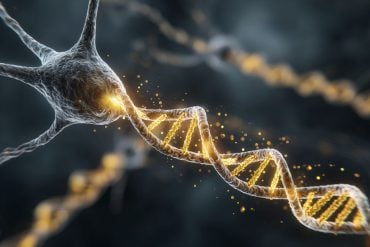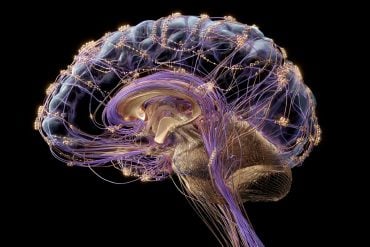Summary:
Scientists at the University of Colorado Boulder have identified an anti-inflammatory fat in the soil-dwelling bacterium, Mycobacterium vaccae, that could explain its stress-quelling effects and aid the development of a microbe-based “stress vaccine”.
This discovery supports the “old friends” or “farm effect” hypothesis, which suggests beneficial soil and environmental microbes have a role in regulating our immune system and suppressing inappropriate inflammation.
Children raised in rural environments, surrounded by bacteria-rich settings, are found to have more stress-resilient immune systems and potentially lower risk of mental illness.
The novel lipid found in M. vaccae, 10(Z)-hexadecenoic acid, is found to bind to a specific receptor in immune cells, inhibiting key pathways driving inflammation.
Key Facts:
- Mycobacterium vaccae, a soil-dwelling bacterium, contains an anti-inflammatory fat, 10(Z)-hexadecenoic acid, which is seen to inhibit inflammation in immune cells and has potential therapeutic applications.
- Children brought up in rural, bacteria-rich environments are found to have more resilient immune systems and potentially lower risks of mental illness, lending support to the “old friends” or “farm effect” hypothesis.
- This research brings scientists closer to the development of a microbe-based “stress vaccine”, a potential therapeutic tool for those in high-stress jobs to counteract the psychological impacts of stress.
Source: University of Colorado at Boulder
Thirty years after scientists coined the term “hygiene hypothesis” to suggest that increased exposure to microorganisms could benefit health, University of Colorado Boulder researchers have identified an anti-inflammatory fat in a soil-dwelling bacterium that may be responsible.
The discovery, published Monday in the journal Psychopharmacology, may at least partly explain how the bacterium, Mycobacterium vaccae, quells stress-related disorders. It also brings the researchers one step closer to developing a microbe-based “stress vaccine.”
“We think there is a special sauce driving the protective effects in this bacterium, and this fat is one of the main ingredients in that special sauce,” said senior author and Integrative Physiology Professor Christopher Lowry.
British scientist David Strachan first proposed the controversial “hygiene hypothesis” in 1989, suggesting that in our modern, sterile world, lack of exposure to microorganisms in childhood was leading to impaired immune systems and higher rates of allergies and asthma.
Researchers have since refined that theory, suggesting that it is not lack of exposure to disease-causing germs at play, but rather to “old friends” – beneficial microbes in soil and the environment – and that mental health is also impacted.
“The idea is that as humans have moved away from farms and an agricultural or hunter-gatherer existence into cities, we have lost contact with organisms that served to regulate our immune system and suppress inappropriate inflammation,” said Lowry, who prefers the phrases ‘old friends hypothesis’ or ‘farm effect.’
“That has put us at higher risk for inflammatory disease and stress-related psychiatric disorders.”
Lowry has published numerous studies demonstrating a link between exposure to healthy bacteria and mental health.
One showed that children raised in a rural environment, surrounded by animals and bacteria-laden dust, grow up to have more stress-resilient immune systems and may be at lower risk of mental illness than pet-free city dwellers.
Others have shown that when a particular bacterium, Mycobacterium vaccae, is injected into rodents, it alters the animals’ behavior in a way similar to that of antidepressants and has long-lasting anti-inflammatory effects on the brain. Studies suggest exaggerated inflammation boosts risk of trauma- and stressor-related disorders, such as posttraumatic stress disorder (PTSD).
One recent Lowry-authored study, published in the Proceedings of the National Academy of Sciences in 2017, showed that injections of M. vaccae prior to a stressful event could prevent a “PTSD-like” syndrome in mice, fending off stress-induced colitis and making the animals act less anxious when stressed again later.
“We knew it worked, but we didn’t know why,” said Lowry. “This new paper helps clarify that.”
For the new study, Lowry and his team identified, isolated and chemically synthesized a novel lipid, or fatty acid, called 10(Z)-hexadecenoic acid found in Mycobacterium vaccae and used next-generation sequencing techniques to study how it interacted with macrophages, or immune cells, when the cells were stimulated.
They discovered that inside cells, the lipid acted like a key in a lock, binding to a specific receptor, peroxisome proliferator-activated receptor (PPAR), and inhibiting a host of key pathways which drive inflammation. They also found that when cells were pre-treated with the lipid they were more resistant to inflammation when stimulated.
“It seems that these bacteria we co-evolved with have a trick up their sleeve,” said Lowry. “When they get taken up by immune cells, they release these lipids that bind to this receptor and shut off the inflammatory cascade.”
Lowry has long envisioned developing a “stress vaccine” from M. vaccae, which could be given to first responders, soldiers and others in high-stress jobs to help them fend off the psychological damage of stress.
“This is a huge step forward for us because it identifies an active component of the bacteria and the receptor for this active component in the host,” he said.
Simply knowing the mechanism of action by which M. vaccae reaps benefits could boost confidence in it as a potential therapeutic. And if further studies show the novel fat alone has therapeutic effects, that molecule could become a target for drug development, he said.

Overall, the study offers further proof that our “old friends” have a lot to offer.
“This is just one strain of one species of one type of bacterium that is found in the soil but there are millions of other strains in soils,” Lowry said. “We are just beginning to see the tip of the iceberg in terms of identifying the mechanisms through which they have evolved to keep us healthy. It should inspire awe in all of us.”
About this Neuroscience and Anxiety research news
Source:
University of Colorado at Boulder
Media Contacts:
Lisa Marshall – University of Colorado at Boulder
Image Source:
The image is adapted from the University of Colorado at Boulder news release.
Original Research: Closed access
“Identification and characterization of a novel anti-inflammatory lipid isolated from Mycobacterium vaccae, a soil-derived bacterium with immunoregulatory and stress resilience properties”. David G. Smith, Roberta Martinelli, Gurdyal S. Besra, Petr A. Illarionov, Istvan Szatmari, Peter Brazda, Mary A. Allen, Wenqing Xu, Xiang Wang, László Nagy, Robin D. Dowell, Graham A. W. Rook, Laura Rosa Brunet, Christopher A. Lowry.
Psychopharmacology. doi:10.1007/s00213-019-05253-9
Abstract
Identification and characterization of a novel anti-inflammatory lipid isolated from Mycobacterium vaccae, a soil-derived bacterium with immunoregulatory and stress resilience properties
Rationale
Mycobacterium vaccae (NCTC 11659) is an environmental saprophytic bacterium with anti-inflammatory, immunoregulatory, and stress resilience properties. Previous studies have shown that whole, heat-killed preparations of M. vaccae prevent allergic airway inflammation in a murine model of allergic asthma. Recent studies also demonstrate that immunization with M. vaccae prevents stress-induced exaggeration of proinflammatory cytokine secretion from mesenteric lymph node cells stimulated ex vivo, prevents stress-induced exaggeration of chemically induced colitis in a model of inflammatory bowel disease, and prevents stress-induced anxiety-like defensive behavioral responses. Furthermore, immunization with M. vaccae induces anti-inflammatory responses in the brain and prevents stress-induced exaggeration of microglial priming. However, the molecular mechanisms underlying anti-inflammatory effects of M. vaccae are not known.
Objectives
Our objective was to identify and characterize novel anti-inflammatory molecules from M. vaccae NCTC 11659.
Methods
We have purified and identified a unique anti-inflammatory triglyceride, 1,2,3-tri [Z-10-hexadecenoyl] glycerol, from M. vaccae and evaluated its effects in freshly isolated murine peritoneal macrophages.
Results
The free fatty acid form of 1,2,3-tri [Z-10-hexadecenoyl] glycerol, 10(Z)-hexadecenoic acid, decreased lipopolysaccharide-stimulated secretion of the proinflammatory cytokine IL-6 ex vivo. Meanwhile, next-generation RNA sequencing revealed that pretreatment with 10(Z)-hexadecenoic acid upregulated genes associated with peroxisome proliferator-activated receptor alpha (PPARα) signaling in lipopolysaccharide-stimulated macrophages, in association with a broad transcriptional repression of inflammatory markers. We confirmed using luciferase-based transfection assays that 10(Z)-hexadecenoic acid activated PPARα signaling, but not PPARγ, PPARδ, or retinoic acid receptor (RAR) α signaling. The effects of 10(Z)-hexadecenoic acid on lipopolysaccharide-stimulated secretion of IL-6 were prevented by PPARα antagonists and absent in PPARα-deficient mice.
Conclusion
Future studies should evaluate the effects of 10(Z)-hexadecenoic acid on stress-induced exaggeration of peripheral inflammatory signaling, central neuroinflammatory signaling, and anxiety- and fear-related defensive behavioral responses.







